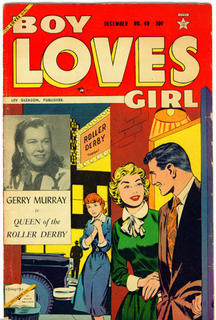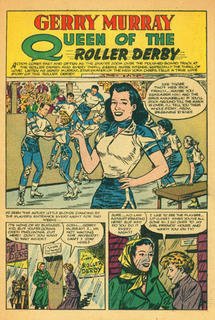 When I was around 10 years old, I remember seeing my first roller derby match on television. It was amazing. Seeing those men and women spin around the banked track, beating each other to submission, made me want to go out, strap on my own roller skates, and take out my sister.
When I was around 10 years old, I remember seeing my first roller derby match on television. It was amazing. Seeing those men and women spin around the banked track, beating each other to submission, made me want to go out, strap on my own roller skates, and take out my sister.I don't remember seeing more than a few episodes of it, as it seemed to be a quick and passing fad. At least to me. It was the early 80s, and I had no idea that roller derby was once a really popular spectator sport. (I also had no clue how they scored -- I was too busy watching people fly 10 feet in the air, landing soundly on their behinds.)
From what little I could find out about the original roller derby leagues, it began in the mid-30s as a dance marathon type contest (where couples had to complete a certain number of laps) and then slowly evolved into a game, with a male-female team, a combination of offense and defense. (Check out some history here.)
It seemed that the roller derby hey-day was in the post-War era of the great American boom. People would try anything, it seemed, and there were enough people around (and more coming every day) that niche sports like roller derby could do very well. It straggled on for a few more decades, but sputtered out in the mid-80s. Since then, there seems to have been a few attempts at reviving it (and how can we forget the movies Rollerball [1975] and Rollerball [2002]? Oh, you've forgotten them both? Huh, me too), but they've either all failed or become a very insignigficant blip on the sports scene.
 But back in the 40s and 50s, it seems like people actually made a living off of this. This includes Gerry Murray, one of the sports all-time greats. (You can read more about Gerry here and here, and would you believe she had her own hair bows.) This issue of Boy Loves Girl (published by Lev Gleason in December of 1954), features a roller derby story where Murray helps out a fan who loves two things: roller derby and Rick French, a member of Murray's team. (I couldn't find a Rick French listed as a roller derby-ite, so he's likely made up.)
But back in the 40s and 50s, it seems like people actually made a living off of this. This includes Gerry Murray, one of the sports all-time greats. (You can read more about Gerry here and here, and would you believe she had her own hair bows.) This issue of Boy Loves Girl (published by Lev Gleason in December of 1954), features a roller derby story where Murray helps out a fan who loves two things: roller derby and Rick French, a member of Murray's team. (I couldn't find a Rick French listed as a roller derby-ite, so he's likely made up.)The story and art (both unsigned) are pretty good, although nothing to write home about. There is a happy ending, however, and Gerry is happy to tell us the love-birds married and had three kids, all destined to be roller derby stars.
The cover is the worst part of the comic, though, and really has nothing to do with the story inside (the trouble is between two guys, not two girs). Lev Gleason's late-40s/early-50s romance comics usually has terrific photo and painted covers, but by then (nearing the end of the companies existence), they had resorted to line-drawn ones, and not very good ones at that.
Of course, if you're a roller derby fan (and who isn't?), I'm sure you're fine either way.
No comments:
Post a Comment